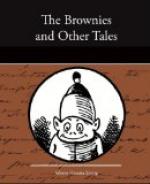“At this moment, a ray of sunshine streaked the deep blue water, and a gleaming sea bird, which had been sitting like a tuft of foam upon a wave, rose with outstretched pinions, and soared away. It was too much. With one shrill pipe of hope, the thrush fluttered from his cage, spread his wings, and followed him.
“When the sailor found that the wind was getting up, he came to take the cage down, and then his grief was sore indeed.
“‘The canary died last voyage,’ he said, sadly. ’The cage was bought on a Friday, and I knew ill luck would come of it. I said so to Mother; but the old lady says there’s no such thing as luck, and she’s Bible-learned, if ever a woman was. “That’s very true,” says I, “but if I’d the money for another cage, I wouldn’t use this;” and I never will again. Poor, bird! it was a sweet singer.’ And he turned his face aside.
“‘It may have the sense to come back,’ said one of the crew. The sailor scratched his head, and shook it sadly.
“‘Noah’s bird came back to him, when she found no rest,’ he said, ’but I don’t think mine will, Tom.’
“He was right. The thrush returned no more. He did not know how wide was the difference between his own strength and that of the bird he followed. The sea-fowl cut the air with wings of tenfold power: he swooped up and down, he stooped to fish, he rested on the ridges of the dancing waves, and then, with one steady flight, he disappeared, and the thrush was left alone. Other birds passed him, and flew about him, and fished, and rocked upon the waters near him, but he held steadily on. Ships passed him also, but too far away for him to rest upon; whales spouted in the distance, and strange fowl screamed; but not a familiar object broke the expanse of the cold sea. He did not know what course he was taking. He hoped against hope that he was going home. Although he was more faint and weary than he had ever yet been, he felt no pain. The intensity of his hope to reach the old wood made everything seem light; even at the last, when his wings were almost powerless, he believed that they would bear him home, and was happy. Already he seemed to rest upon the trees, the waters sounded in his ears like the rustling of leaves, and the familiar scent of the pine-tree seemed to him to come upon the breeze.
“In this he was not wrong. A country of pine-woods was near; and land was in sight, though too far away for him to reach it now. Not home, but yet a land of wondrous summer beauty; of woods, and flowers, and sun-flecked leaves—of sunshine more glowing than he had ever known—of larger ferns, and deeper mosses, and clearer skies—a land, of balmy summer nights, where the stars shine brighter than with us, and where fireflies appear and vanish, like stars of a lower firmament, amid the trees. As the sun broke out, the scent of pines came strong upon the land breeze. A strange land, but the thrush thought it was his own.




